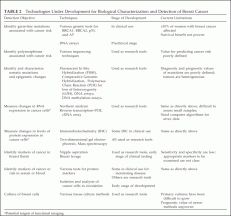Technologies in Development
Thus, a great deal of work remains to be done to optimize the benefits and minimize the risks of breast cancer screening.
A number of technologies that may help to define the biological nature of breast lesions are being developed, including culture of breast cancer cells in the laboratory, measurement of protein expression in cancer cells, identification of markers of cancer cells or the proteins that they secrete in blood or breast fluid, or identification of genetic changes in tumors (Table 2). Further progress in this field will depend on the establishment, maintenance, and accessibility of tissue specimen banks, as well as access to new high-throughput technologies and bioinformatics.
 TABLE 2 -Technologies Under Development for Biological Characterization and Detection of Breast Cancer
TABLE 2 -Technologies Under Development for Biological Characterization and Detection of Breast Cancer
Technologies based on biology could potentially contribute to improved patient outcomes in several ways. For example, they could distinguish between early lesions that require treatment because they are highly likely to become lethal and those that are not. In many instances, these technologies could also potentially identify fundamental changes in the breast that appear before a lesion can be detected by current imaging methods. Thus, they may identify women at high risk of developing breast cancer or, more importantly, women at high risk of dying from breast cancer.
Such women could then undergo more frequent screening or would perhaps benefit from newer imaging technologies. Some women might also choose to explore a “risk reduction strategy” that would affect all breast cells (e.g., bilateral prophylactic mastectomy), although current strategies for risk reduction are less than ideal. Improved understanding of the biology and etiology of breast cancer could also lead to better prevention strategies, which would further increase the benefits of early detection.
###
Sharyl J. Nass, I. Craig Henderson, and Joyce C. Lashof
Committee on Technologies for the Early Detection of Breast Cancer
National Cancer Policy Board INSTITUTE OF MEDICINE and Division of Earth and Life Studies
NATIONAL RESEARCH COUNCIL